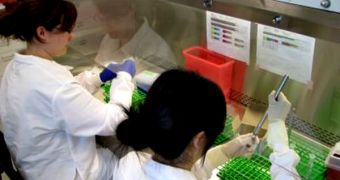When the NASA orbiter Atlantis takes off on May 14, for its final planned flight, it will also carry a scientific experiment devised by researchers at the Rensselaer Polytechnic Institute (RPI). Experts here have developed a special container, in which they will place a large group of microorganisms, mostly bacteria. The lifeforms will spend about 7 days on the International Space Station (ISS), subjected to the conditions of microgravity, before they are finally returned home when the shuttle lands.
The goal of this investigation is to analyze the development of the microorganisms and to create new methods of preventing the development of biofilms. These are protective layers that certain types of bacteria create around themselves, in order to protect them from the immune system of an infected host. These thin films are notoriously difficult to destroy, and they can allow for bacterial colonies to multiply out of control. The situation is serious on Earth, but it gets even more serious once you translate it to the tight confines of the ISS. Here, any infection takes on disastrous proportions.
“We know that gravity plays a key role in the development of biological systems, but we don't know exactly how a lack of gravity affects the development of bacteria and biofilms. This means while (sic!) certain bacteria may be harmless on Earth, they could pose a health threat to astronauts on the International Space Station or, one day, long space flights. Our goal is to better understand how microgravity affects the relationship between humans and bacteria, so we can develop new ways of reduce the threat of biofilms to spacecraft and their crew,” explains the leader of the Micro-2 experiment, scientist Cynthia Collins.
She is based at the RPI Department of Chemical and Biological Engineering, where she is an assistant professor. Once the experiment is back on safe ground, the expert will be in charge of the team that will analyze the changes. The testing phase will take place at the RPI Center for Biotechnology and Interdisciplinary Studies (CBIS). Other members of the group include the RPI Howard P. Isermann Professor of Chemical and Biological Engineering Jonathan Dordick, who is a nanobiotechnology expert, as well as CBIS director and thin films expert Joel Plawsky. The latter is also a professor in the Department of Chemical and Biological Engineering at the Institute.

 14 DAY TRIAL //
14 DAY TRIAL //